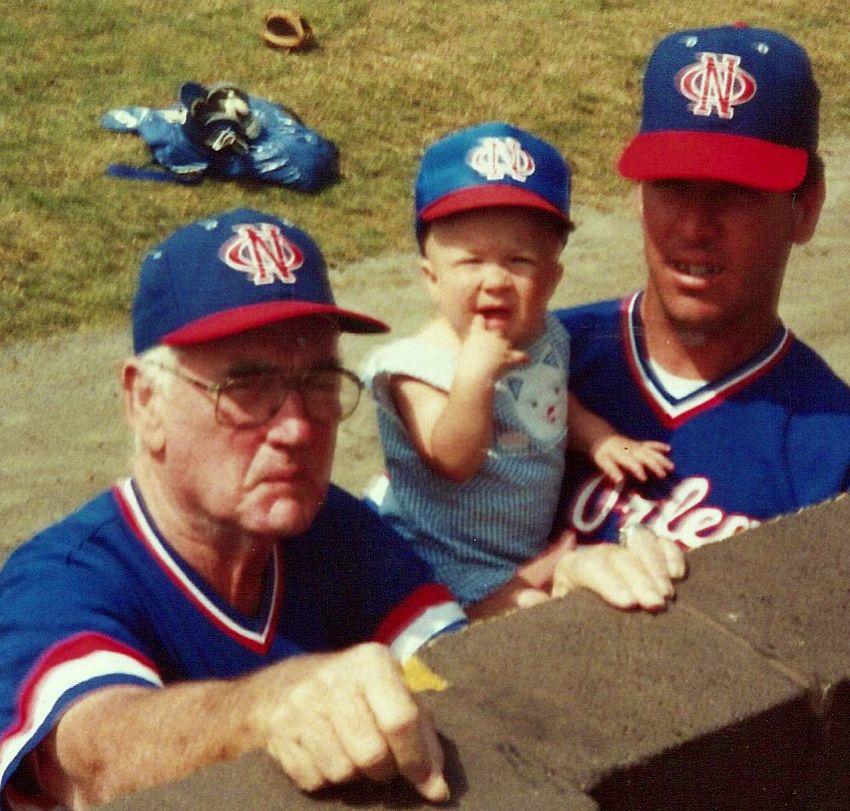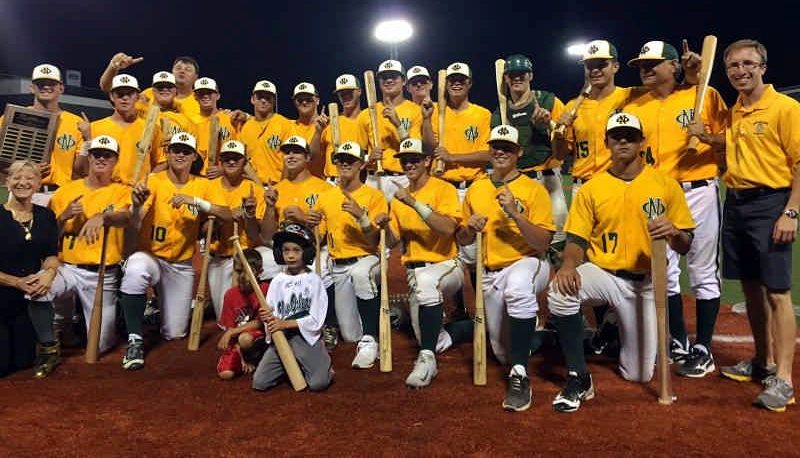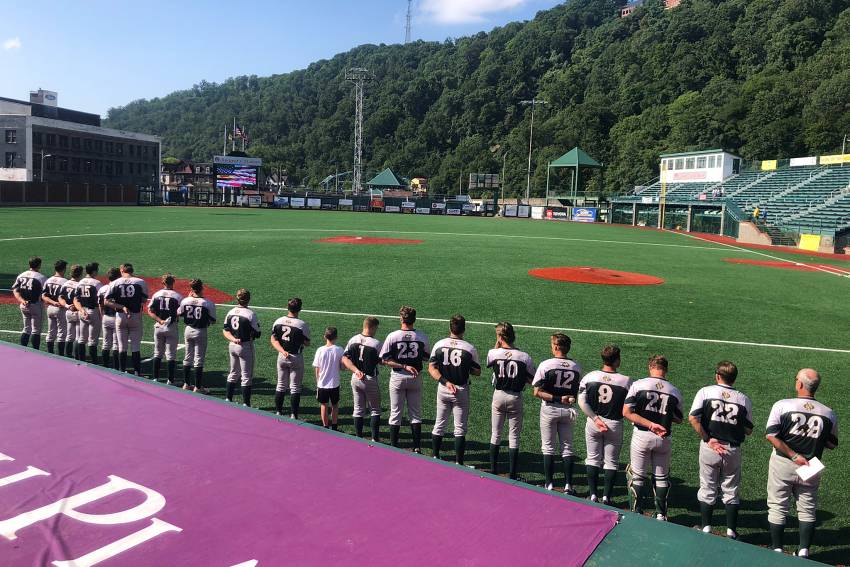New Orleans’ tradition gives a boost to its quest for record Johnstown title

NEW ORLEANS – The New Orleans franchise has won the most games all time in the All-American Amateur Baseball Association.
It has won 378 games, and its 18 national championships are second only to Baltimore’s 29 titles.
Now the 2023 version of the team called the Boosters can add a new entry to the Crescent City franchise’s many accomplishments by winning a fourth consecutive national championship.
Washington also won three straight (1997-99) and Baltimore, which no longer competes in the AAABA, won three straight from 1989-91, four straight titles from 1980-83 and a record six straight from 2003-08.
The Boosters, who have won five of the last seven titles, prevailed in 2019, 2021 and 2022, and the tournament was not held in 2020 because of COVID.
New Orleans, which will play its first game in the tournament at 11 a.m. CDT on Monday in Johnstown, Pennsylvania against an opponent to be determined, is comprised mostly of players with little or no Johnstown experience.
But the 77th edition of the team will attempt to do what this franchise has done for generations – reach new heights while standing on the shoulders of those who preceded them.
“We teach them about the history of all the guys that have gone before them,” Boosters coach Doug Faust said. “And all the guys that went before them are going to be reading the press clippings and want to see the scores and they want to have pride in the New Orleans Boosters. So we make sure that they understand the importance of that before we go up there.”
What’s right on and off the field
Faust and other Johnstown veterans try to prepare the players, who range in age from seniors in high school to college players that were younger than 22 as of May 1, for the hoopla that will surround their weeklong stay.
Infielder Jake Kaufmann was told before making his Boosters debut last summer “that it’s like the Yankees coming to town.”
He and the other Johnstown rookies were a bit skeptical that the reception would be as grand as it was being described.
Then they experienced it.
“They were not lying,” Kaufmann said.
The locals’ “love for the New Orleans squad” transcends baseball, according to Paul Zimmermann, who played on the 1971 championship team, watched his son play on the 2009 championship team and has been a spectator in Johnstown for the last several years.
“They know that they’re going to get a squad that is not only good players, but just good people,” Zimmermann said. “These guys handle themselves well and carry the New Orleans name in good standing up there. It makes me proud to go up there. It’s good, clean baseball fun.”
The New Orleans Boosters’ All-American Collegiate League, which began play in June at Kirsch-Rooney Stadium, annually produces the team that will compete in Johnstown.
The players immediately are introduced to the “culture” of the program – the history of success and the traditional expectations for behaving like champions on and off the diamond.
Even personal grooming is part of the culture for grooming personnel to compete in Johnstown.
The “league policies and procedures” that participants in the league receive at the start include the following rule: “Players should be clean-shaven at all times throughout their time in the league. Hair should not reach below the shoulders.”
Mount Rushmore of New Orleans franchise
The four teams that compete in the league are named for men who can be considered Mount Rushmore figures of New Orleans AAABA baseball – Louis “Rags” Scheuermann, for whom the field at Kirsch-Rooney is named and who coached New Orleans to a title 70 years ago, starting this city’s only other three-year title run; Skeeter Theard, an assistant coach from 1965-2000, Jean Faust, Doug’s father who was an assistant from 1972-97; as well as long-time New Orleans franchise representative Ray Pelleteri.
All four men are deceased but the presence of their spirit will be as palpable in Johnstown as the Boosters’ familiar green and gold uniforms.
Scheuermann and Pelleteri are among nine New Orleans representatives in the AAABA Hall of Fame. The others are Scheuermann’s son Joe, who played for his father, was an assistant coach under him and succeeded him as head coach, winning three titles himself during his tenure (1992-2006); former players Kurt Ainsworth, Steve Mura, Wally Whitehurst and Wayne Pietri; as well as another franchise rep, Ronald McDonald, and Dr. Henry LaRocca, whose long-time tenure as primary sponsor began with the championship teams in the 50s.
Additionally, each of the coaches in the All-American League this season – Faust, Brad Farizo, who will assist Faust in Johnston; David Baudry, Nelson Graham and Chris Westcott – all played in the league.
“You’ll see kids do things the right way during the league,” Faust said. “They play the game the right way during the league because all of these coaches understand how it should be done.”

A family tradition
That brings us back to Rags Scheuermann.
Al Bropauper coached New Orleans’ first two AAABA teams (1946-47) and Johnny Altobello coached the next three, bringing home New Orleans’ first championship in 1948.
But nearly everyone who has been part of the Boosters since then has their connection to the program through Rags Scheuermann, who succeeded Altobello in 1951 – either directly or indirectly through Joe Scheuermann and other members of the family operating behind the scenes.
“This is a family tradition; this is a New Orleans tradition,” said Covenant Christian High School head coach Joe Teuton, who played on the 1990 Johnstown team and was head coach of the 2015 title team.
“The whole Scheuermann family has been a tremendous help to the whole AAABA League,” said Frank Fortunato (1967-68), who played on a title team in his second season. “Without them New Orleans would have folded. We wouldn’t have had a team if Joe hadn’t kept up the legacy of his dad.”
Rags turned the reigns over to Joe after the summer of 1991 just as he handed his son his position as head coach at Delgado Community College.
Less than six years later, Rags passed away after a making a final request of his son and successor.
“One of the promises I made to my dad on his deathbed – I’m not exaggerating this – was that we’d keep this alive,” Joe said. “We talked about the Delgado program and we talked about the Johnstown program and he said, ‘make this promise to me: Keep it going.’ That’s been my commitment and why we stay so involved with my family because it was his want.”
Joe’s tenure as Boosters coach ended after the 2006 season when the National Junior College Athletic Association adopted a rule that junior-college coaches can’t coach their players during the summer.
“I became a fan and a spectator,” Scheuermann said.
Thirteen of the 20 players on this year’s Johnstown team will attend Delgado in the fall, which is consistent with the relationship between the two programs for decades.
An increase in the age limit for the AAABA several years ago has led to more college players participating, but the franchise traditionally has drawn significantly from New Orleans’ Catholic League high schools and others throughout the area, especially in the River Parishes.
“It’s Greater New Orleans,” Joe Scheuermann said. “I think that’s the greatest part about it all. It’s been that way since the beginning.”
Rags’ impact is still felt
Riverside High School coach Marty Luquet is a rare member of the Boosters family – a foreigner. The Chicago native was lured away from home by Ron Maestri to play baseball at the University of New Orleans.
Luquet began his illustrious high-school coaching career at O. Perry Walker and caught the eye of Rags Scheuermann.
“Rags saw me and thought enough of me to ask me if I wanted to be a part of the All-American program,” said Luquet, who was an assistant coach under Rags on the 1988 title team. “Anyone who ever got the chance to be around Rags Scheuermann just felt like they were special.
“He made you feel like you were very important to this program – whether you were or not. I was the seventh coach on that team. But once Rags did that to you, you always felt like you were a part of this program. And Joe has carried that over to where anyone who has ever been on one of these teams or coached them, he’s reached out to you and kept you a part of it.”
Luquet returned in 2015 and was an assistant under Teuton’s title team.
“If you’re fortunate enough to do it for more than one year,” Teuton said, “you’ve got a really good chance of winning (a championship).”
Tom Schwaner played just one season with the Boosters (in 1957) and didn’t win a championship, but still he said, “I owe everything to Rags Scheuermann and the All-American League.”
Schwaner was one of five players on the ’57 team to follow Rags to Loyola when the coach took over the Wolf Pack program the following year. He followed a brief playing career in the St. Louis Cardinals organization with a successful high-school coaching career, modestly crediting “professional ball” and Scheuermann’s instruction of fundamentals “for allowing me to be a fairly good coach.”
“That’s all I did was fundamentals,” said Schwaner, who was Rummel’s first coach in 1971 and led Schaff Brothers to its first two state titles and later Brother Martin to its first district title. He ultimately became the second-winningest head coach behind Maestri in UNO history.
Fortunato, in addition to his All-American League experience, played for Rags in Babe Ruth ball and for four seasons at Loyola. He became one of the driving forces behind the formation of the Grand Slam Gala that has served as the primary fund-raiser for the Johnstown trip since the mid-1980s, saying he feels “indebtedness to Rags Scheuermann.”
“He gave me a scholarship right in the middle of the Vietnam War,” Fortunato said. “I might not have even gone to a college if it weren’t for Rags. I always had that in the back of my mind – that anything I could do to help him or any league he was involved in I was going to help him.”
First class all the way
The gala, which was held July 16, has enabled the New Orleans team to travel first class for nearly four decades.
Joe Scheuermann’s first trip to Johnstown as an infant was by train and the Boosters made the 14-hour-plus bus trip for many years before the gala came along.
The event has been held over the years at venues as diverse as the myriad contributors – Gallier Hall, Jefferson Downs, Delgado, the Fair Grounds and for the last several years Rock ‘N’ Bowl.
The Boosters try to go first class all the way. The team flies to Pennsylvania and travels around in a charter bus. The franchise handles its own hotel stay and all meals are served by an in-house caterer.
Tickets to the first gala cost $100 a couple and today the price remains the same even as the number of tickets sold annually has increased more than five-fold.
Most of the gala tickets are bought by former All-American League players, who gather to relive their Johnstown experiences.
But among the non-baseball players at this year’s gala was a player familiar to football fans – former McNeeseState, New Orleans Breakers and New Orleans Saints running back Buford Jordan, who attended with his wife Adries.
Adries works for Larry Gibbs, whose construction company is a long-time Boosters sponsor, and the Jordans have attended the gala “several times before.”
“We’re just out supporting a good cause,” said Buford, who played baseball until he was 16. “Any program that does things to help young people and gives them opportunities, I’m ready to support that. And that’s what they’re doing here and I’m happy to be a part of it.”
This year’s Boosters team was announced the day after the gala and the players immediately organized a group chat among themselves.
“We don’t take this lightly,” Kaufmann said. “A lot of people pay a lot of money to send us up there. We don’t have to pay a dime to go up there. It’s a special trip. They do a lot for us and we appreciate it.”

Memories for a lifetime
The Boosters alumni continue to appreciate the experience they had as players, which is why they happily provide the opportunity for more recent generations to have the same experience.
“It’s a memory I’ll live with for the rest of my life,” Fortunato said. “The year 1968 was a very special year for me. It was one of the greatest summers ever for me – playing in the All-American League, getting picked to play in Johnstown, going there and winning the tournament.”
Fortunato, who was often times a late-inning defensive replacement, is most fond of his experience in right field in the late innings of the title game in ’68. New Orleans was clinging to a one-run lead when the team from Ann Arbor, Michigan put a runner on first and one of its batters hit a drive into right-center.
The center fielder chased after the ball, but couldn’t quite catch up to it as Fortunato backed up the play. The ball caromed off the wall to Fortunato, who threw a strike to second baseman Gary Bono, who was a year behind Fortunato at Redemptorist High School, and Bono’s relay throw caught the runner at the plate, and the team known as the NORD-Mid City Kiwanis went on to prevail 2-0.
“That was my highlight,” Fortunato said.
Southeastern Louisiana athletic director Jay Artigues, who had a successful eight-year run as the Lions head baseball coach, played on the 1989 Johnstown team and his father, grandfather and uncle were there to watch.
“It was one of the best experiences of my life,” Artigues said. “I loved it and I’m glad I had the opportunity to do it with coach Rags too. It was exciting to have a small part of that tradition of playing for him.”
That team spent the week prior to the tournament training at the U.S. Naval Academy in Annapolis, Maryland and the team attended a Baltimore Orioles game.
“That was the best experience I’ve ever had baseball wise,” Artigues said.
Legacy means a lot
There are numerous examples of Johnstown legacies – New Orleans families that have had multiple generations represented in Johnston.
Paul Zimmermann said “it was a really a kick” watching son Joseph play on the 2009 title team to carry on “the family tradition.”
“Legacy means a lot in New Orleans,” Paul Zimmermann said. “It seems like no matter what aspect of our society, you’re always talking about the various generations repeating what the prior generations did. It’s just a part of the fabric of New Orleans.”
Artigues’ son Casey immediately called his father after learning he would make his Johnstown debut this summer. It was difficult to tell which of the two was more excited.
“The first thing I did,” Jay said, “was email my boss and tell him I’m taking off for a week and heading to Pennsylvania. I can’t wait to get up there. I still have a picture on my mantle of my grandfather and I going up the Inclined Plane at Johnstown.
“I’m glad I got to see it through a player’s eyes and now I get to go as a parent.”
Artigues’ grandfather and uncle that accompanied him to Johnstown “have passed away, but my dad still talks about that trip,” Jay said. “He was telling Casey all about it.”
“It seems like a once-in-a-lifetime experience,” Casey said.
More than a week-long tournament
Speaking of legacies, other than Joe Scheuermann, it’s difficult to imagine anyone being better prepared to coach a New Orleans team in Johnstown than Faust.
He started making the trip as an eight-year-old bat boy to watch his dad assist Rags. Doug’s brother Donny also was a bat boy.
Rags let Doug take grounders with the team once he became a teen-ager.
“That was our big vacation in the Faust family back in the 70s,” Doug said, “going to Johnstown.”
Doug played on the ’85, ’86 and ’87 teams and already was hearing the calling to follow in his dad’s footsteps as a coach.
“The biggest thing is I didn’t want to get away from baseball,” Doug said. “The only way to stay in it was to coach it”
Faust was an assistant under Joey Latino the last two seasons and when Latino was sidelined by shoulder surgery this summer, Faust was the logical replacement.
He last coached high-school ball at Archbishop Shaw two years ago and currently is working in private business. But he made sure to find room in his schedule for the All-American League.
“I need to coach baseball,” Faust said. “This is a great honor. My dad would be so happy. He and coach Rags raised me as a coach. To me it’s a lot more than going to play a week-long tournament in Johnstown.”
Faust understands the double-edged sword of inheriting a team that’s on a championship roll and can make history.
“We won the last three years. If we lose, I screwed it up,” Faust quipped.

“This is a big deal”
The Boosters will arrive in Johnstown on Saturday. On Sunday, as is their tradition, the players will don coats and ties to register for the tournament, then head to St. John’s Gaulbert Cathedral in downtown for the 11 a.m. Mass before going to the ball park.
The players will be mindful of Faust’s instructions to “sign every ball that a kid asks you to sign, be as polite as you can be, take as many pictures as you can because this is a big deal.”
Every team in the field of 16 is guaranteed three games during pool play divided among seven ballparks in the Johnstown area. The top two teams in each of the four pools will advance to the quarterfinals and compete in a single-elimination format at The Point – the crown jewel of the ballparks – and the championship will be decided there on Saturday, August 5.
Zimmermann said he still gets “a kick” out of the old-time ballpark atmosphere at The Point, complete with traditional organ music.
“It’s good baseball, good people and a little bit of Americana,” he said.
Special connection between Johnstown and New Orleans
Louisiana baseball fans were recently reminded of the special connection between a local team and its home away from home.
The LSU Tigers returned to Omaha, Nebraska for their first appearance in the Men’s College World Series in six years. The success of the Tigers’ program – which won its seventh national championship in its 19th appearance – and the consistently large contingent of their tailgating fans reignited a kinship between the host city and its visitors from Louisiana.
“It looks like Louisiana baseball is on a roll right now,” Fortunato said.
Think of the relationship that the Boosters and their entourage have with the folks in Johnstown as the LSU-Omaha relationship on steroids.
The Crescent City and the town of some 18,000 people, located 57 miles east of Pittsburgh have little in common on the surface.
But decades of visits by New Orleans teams to Johnstown have forged “a bond that’s unbreakable,” as Kaufmann put it, and bridges the 1,000-mile distance between the two cities.
Generations of Johnstown residents have endured historic floods just as generations of New Orleans residents have endured historic hurricanes.
The devastating flooding that took place in New Orleans and the Gulf Region in the wake of Hurricane Katrina in 2005 reminded Johnstown residents of the catastrophic flooding they suffered in 1977 as well as 1936 and the epic Great Flood of 1889.
Eleven months after Katrina, Joe Scheuermann’s last team entered the stadium during the traditional Olympic-style parade of teams on the eve of the competition and received a standing ovation from the sellout crowd of 10,000.
“It was a special moment,” Scheuermann said.
Bill Wells, a Johnstown resident affectionately known as Wild Bill, started following the New Orleans teams in the early years of Joe Scheuermann’s tenure as head coach.
Wells was a corn farmer and got in the habit of sending a bushel of corn to Scheuermann’s mother, Maureen, after each year’s harvest, just weeks after the Johnstown tournament.
“The UPS truck would show up with this huge, huge box and we knew it was Mr. Bill’s corn,” Joe Scheuermann said.
When Wells passed away a few years ago, his daughter contacted Scheuermann to share the news.
“She said, ‘I just want you to know that my Dad wanted to be buried with his New Orleans hat on,’” Scheuermann recalled.
There are other instances of Johnstown residents being buried in their New Orleans hats.
New Orleans players have been leaving their hats and gear behind in Johnstown going back to the early champions.
That’s when Dr. LaRocca, the Hall of Fame sponsor of the early teams who also was a general practitioner and instrumental in the opening of West Jefferson Hospital, spontaneously started a tradition after Rags’ team gave the coach his first championship 70 years ago.
“Dr. LaRocca gave basically everything away,” Joe Scheuermann said. “When we won a championship he’d tell the kids, ‘give away your gloves, your hats, I’ll buy you all new stuff when we get home.”
Now when New Orleans wins a championship Johnstown kids in the stands line up atop the Boosters dugout, waiting for the celebratory dogpile to end and try to grab souvenirs, not unlike the New Orleans kids at a Mardi Gras parade.
Joe Scheuermann reflected on his father’s “passion for the city of Johnstown,” which named the entire Scheuermann family “Honorary Citizens” in 1993.
“He loved going there and he loved representing New Orleans,” Scheuermann said. “It’s a special place for us.”
- < PREV Saints taking hard look at both young and old to bolster offense
- NEXT > Wayne Reese, Sr. to be Inducted into Greater New Orleans Sports Hall of Fame
Les East
CCS/SDS/Field Level Media
Les East is a nationally renowned freelance journalist. The New Orleans area native’s blog on SportsNOLA.com was named “Best Sports Blog” in 2016 by the Press Club of New Orleans. For 2013 he was named top sports columnist in the United States by the Society of Professional Journalists. He has since become a valued contributor for CCS. The Jesuit High…





